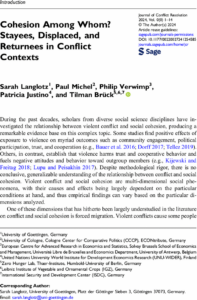During the past decades, scholars from diverse social science disciplines have investigated the relationship between violent conflict and social cohesion, producing a remarkable evidence base on this complex topic. Some studies find positive effects of exposure to violence on myriad outcomes such as community engagement, political participation, trust, and cooperation (e.g., Bauer et al. 2016; Dorff 2017; Tellez 2019). Others, in contrast, establish that violence harms trust and cooperative behavior and fuels negative attitudes and behavior toward outgroup members (e.g., Kijewski and Freitag 2018; Lupu and Peisakhin 2017). Despite methodological rigor, there is no conclusive, generalizable understanding of the relationship between conflict and social
cohesion. Violent conflict and social cohesion are multi-dimensional social phenomena, with their causes and effects being largely dependent on the particular conditions at hand, and thus empirical findings can vary based on the particular dimensions analyzed.
Publication Details
- Year of Publication: 2024
- DOI: https://doi.org/10.1177/00220027241254585






